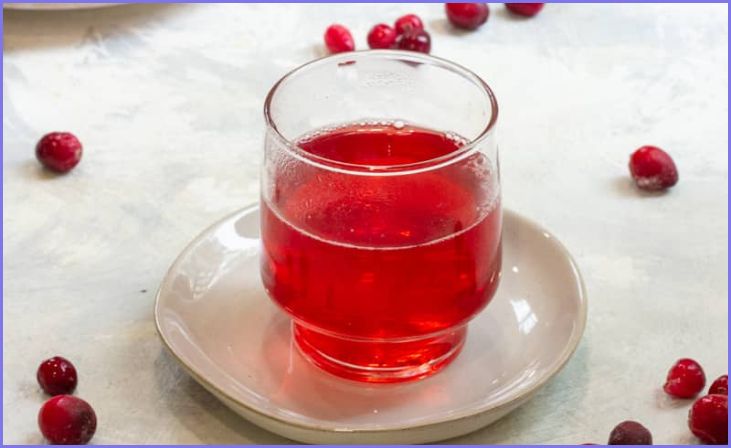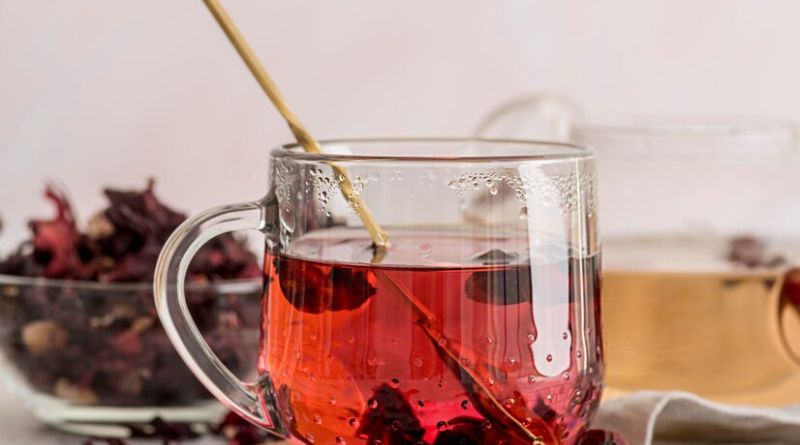Benefits of Cranberry Tea – Cranberry tea, a delightful infusion with a rich history, offers more than just a pleasing taste. Derived from the vibrant red berries known for their tart flavor, this tea has gained popularity for its potential health benefits. Packed with essential vitamins, minerals, and powerful antioxidants, cranberry tea goes beyond being a refreshing beverage.
From promoting urinary tract health to supporting the immune system and contributing to cardiovascular well-being, the advantages of incorporating cranberry tea into one’s routine are diverse.
In this outline, we explore the nutritional content, health benefits, immune system support, weight management potential, impact on skin health, and antioxidant properties of cranberry tea. Additionally, we’ll delve into methods of preparation, precautions, and considerations to fully appreciate the holistic advantages of this flavorful and nutritious brew.
Benefits of Cranberry Tea
Rich in Antioxidants

Cranberry tea boasts a wealth of antioxidants, powerful compounds that combat free radicals in the body. These antioxidants, including flavonoids and polyphenols, help neutralize oxidative stress, potentially reducing the risk of chronic diseases.
Regular consumption of cranberry tea may contribute to overall health by promoting cellular well-being and supporting the body’s natural defense mechanisms.
Urinary Tract Health
Cranberry tea is renowned for promoting urinary tract health. Its active compounds, particularly proanthocyanidins, hinder the adherence of bacteria, like E. coli, to the urinary tract walls, potentially preventing infections. By inhibiting bacterial colonization, cranberry tea may be a natural and preventive measure against urinary tract infections (UTIs).
Regular consumption could contribute to maintaining a healthy urinary system and reducing the recurrence of UTIs. As a flavorful and hydrating beverage, cranberry tea provides a proactive approach to supporting urinary tract wellness. However, individuals with specific health concerns should consult with a healthcare professional for personalized advice.
Also, Read – How to Make Probiotic-Rich Fermented Salsa at Home
Heart Health
Cranberry tea may positively impact heart health due to its rich antioxidant content. Antioxidants, such as flavonoids, help reduce inflammation and improve cholesterol levels, potentially lowering the risk of cardiovascular diseases.
Regular consumption of cranberry tea may contribute to maintaining a healthy cardiovascular system by supporting blood vessel function and combating oxidative stress.
Additionally, the tea’s low-calorie nature makes it a heart-healthy beverage choice. However, it’s crucial to incorporate cranberry tea as part of a balanced diet and lifestyle, and individuals with existing heart conditions should seek personalized advice from a healthcare professional.
Digestive Health
Cranberry tea may benefit digestive health through its potential to promote a balanced gut flora. The tea’s antioxidants and anti-inflammatory properties could contribute to a healthier digestive system by reducing inflammation and supporting the growth of beneficial bacteria.
This may enhance overall digestion and nutrient absorption. As a low-calorie and flavorful beverage, cranberry tea provides a hydrating option that can complement a well-rounded diet.
While it may contribute to digestive well-being, individual responses vary, and consulting with a healthcare professional is advisable for personalized dietary recommendations, especially for those with specific digestive concerns.
Anti-Inflammatory Properties

Cranberry tea exhibits notable anti-inflammatory properties attributed to its rich array of antioxidants, including flavonoids and polyphenols. These compounds help quell inflammation by neutralizing free radicals and modulating inflammatory pathways.
Regular consumption of cranberry tea may contribute to reducing systemic inflammation, potentially mitigating the risk of chronic diseases associated with prolonged inflammation.
As part of an anti-inflammatory diet, this flavorful tea can be a valuable addition to promote overall health. However, individual responses vary, and consulting with a healthcare professional is advisable, especially for those with inflammatory conditions or specific health concerns.
Also, Read – Deliciously Cheesy Veggie Side Dishes
Immune System Support
Cranberry tea provides immune system support through its rich blend of vitamins, antioxidants, and phytonutrients. Vitamin C, present in cranberries, enhances immune function by promoting the production of white blood cells.
The tea’s antioxidants, such as quercetin and resveratrol, contribute to a robust immune response by combatting oxidative stress. Regular consumption of cranberry tea may fortify the body’s defenses against infections and illnesses.
As a flavorful and hydrating beverage, it can be a tasty way to bolster overall immune health. While cranberry tea can be beneficial, individual health conditions vary, and consulting with a healthcare professional is advisable for personalized guidance.
Rich in Vitamins
Cranberry tea is a vitamin-packed beverage, offering essential nutrients vital for overall health. It is notably rich in vitamin C, known for its immune-boosting properties and antioxidant benefits. Additionally, cranberry tea provides vitamins A and K, supporting vision, skin health, and blood clotting.
The B vitamins present contribute to energy metabolism, nervous system function, and overall well-being.
Incorporating cranberry tea into your diet can be a flavorful way to ensure a diverse range of vitamins essential for various bodily functions, promoting overall health and vitality. However, individual dietary needs vary, and consulting with a healthcare professional is recommended for personalized advice.
Hydration
Cranberry tea serves as a hydrating and low-calorie beverage, contributing to daily fluid intake. Adequate hydration is vital for bodily functions, including digestion, circulation, and temperature regulation.
The water content in cranberry tea, combined with its appealing flavor, makes it an enjoyable option to help meet hydration needs. While it doesn’t replace plain water, incorporating cranberry tea into your daily beverage choices can be a tasty way to stay hydrated.
Individuals should consider their overall fluid intake from various sources and consult with a healthcare professional for personalized hydration recommendations, especially in the presence of specific health conditions.
Dental Health
Cranberry tea may support dental health by hindering the adhesion of certain bacteria to teeth. Compounds in cranberries, particularly proanthocyanidins, may help prevent the formation of dental plaque, reducing the risk of cavities and gum disease. While not a substitute for regular oral hygiene practices, incorporating cranberry tea into a balanced dental care routine may offer additional benefits.
Its natural properties make it a flavorful and potentially advantageous choice for those seeking to promote oral health. Individuals with specific dental concerns should consult with a dentist for personalized advice on maintaining optimal oral hygiene.
Weight Management

Cranberry tea can be a valuable addition to a weight management plan. As a low-calorie beverage, it provides a flavorful alternative to high-calorie drinks, supporting calorie control. The tea’s natural compounds may also contribute to a feeling of fullness, potentially reducing the likelihood of overeating. Additionally, staying hydrated with cranberry tea can promote a sense of satiety.
While not a standalone solution for weight management, incorporating cranberry tea into a balanced diet and active lifestyle may be a tasty and hydrating way to support your weight goals. Individuals should consider their overall diet and health status, seeking personalized advice for effective weight management.
Conclusion
In conclusion, cranberry tea emerges as more than a flavorful beverage, showcasing a spectrum of health benefits. Its role in preventing UTIs, supporting cardiovascular health, bolstering the immune system, aiding weight management, enhancing skin health, and providing a rich source of antioxidants underscores its value. With diverse brewing options, it stands as a versatile addition to a health-conscious lifestyle. While enjoying its taste, one can savor the satisfaction of contributing to overall well-being. As research unfolds, the potential of cranberry tea continues to offer a promising avenue for both taste enthusiasts and health-conscious individuals alike.
FAQs
Cranberry tea may positively impact blood pressure and cholesterol levels due to its antioxidant content. Regular consumption as part of a balanced diet may support overall cardiovascular well-being.
Yes, cranberry tea is a low-calorie beverage that can be a part of a weight management plan. Its potential to boost metabolism and contribute to a balanced diet makes it a healthy choice for those watching their weight.
Yes, the antioxidants in cranberry tea may contribute to healthier skin by combating oxidative stress. While not a substitute for a skincare routine, incorporating cranberry tea into your diet may provide additional benefits for skin health.







